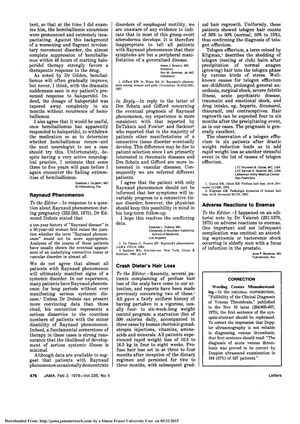Wording Creates Misunderstanding
February 1976
in “
JAMA
”

TLDR A drug helped quickly reduce a movement disorder, experts debated the severity of Raynaud phenomenon, and rapid weight loss was linked to temporary hair loss with good recovery.
In a letter to the editor, Dr. Gordon J. Gilbert reported a case of hemiballismus, a movement disorder, which was almost completely suppressed within 48 hours of starting haloperidol therapy, suggesting a therapeutic response to the drug. He noted that while hemiballismus often improves gradually, the suddenness of the improvement in his patient was dramatic and the disorder did not recur after haloperidol was tapered off over six months. In a separate discussion, Drs. Irwin J. Schatz and Ray W. Gifford, Jr. disagreed with Dr. Edmund Dubois's statement that almost all patients with Raynaud phenomenon eventually develop a systemic disorder, arguing that many patients experience Raynaud phenomenon without serious systemic disease and that suggesting otherwise is a disservice. They emphasized the importance of reassuring patients about the minimal likelihood of developing serious systemic illness. Lastly, LTC Richard B. Odom and LTC Detlef K. Goette reported cases of telogen effluvium, a condition of hair loss, following rapid weight loss from a starvation diet, adding rapid weight loss to the list of stress events that can cause this condition. They observed hair regrowth four to six months after the precipitating event and considered the prognosis to be excellent.




